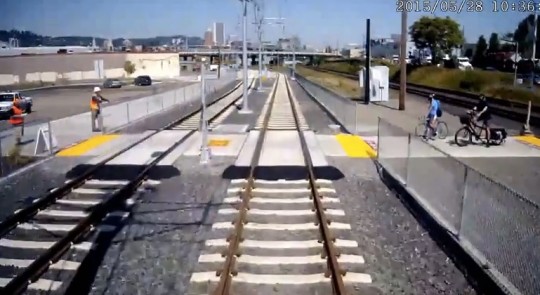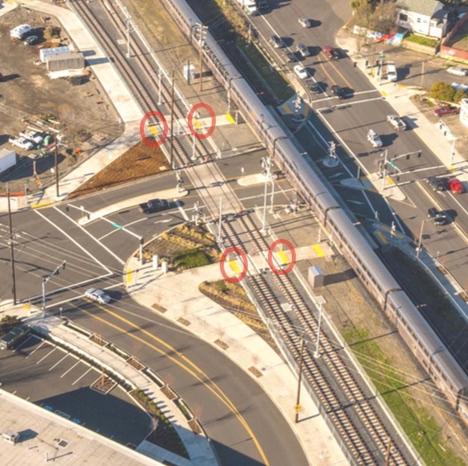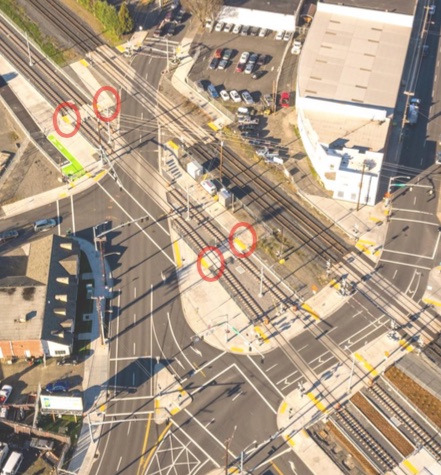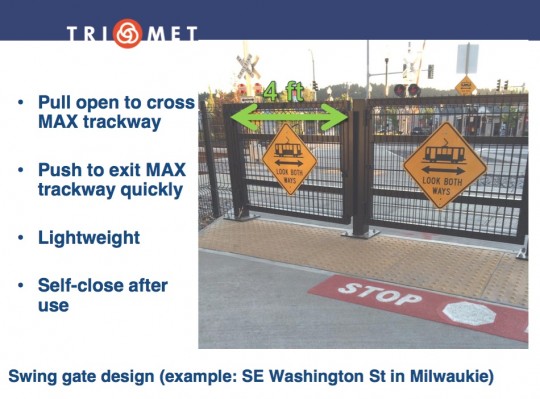
Saying they’ve observed dangerous behaviors by people using bikes during testing of light rail trains on the new MAX Orange Line, TriMet wants to install gates on two track crossings in inner southeast Portland.
“We share your interest in convenience and having welcoming bicycle facilities, but we have to balance that with safety concerns.”
— Jennifer Koozer, TriMet Community Affairs
TriMet reps made the announcement last night during a presentation (PDF) at the Bureau of Transportation’s Bicycle Advisory Committee. The proposal was met with serious concerns by members of the committee. They grilled TriMet with questions and did not give their support for the plan.
The four-foot tall gates would be installed at SE 8th and 11th Avenues and would be closed at all times (whether a train is coming or not), requiring people to swing them open in order to pass through (hence the name “swing gates”). For some people — like those with front-loading cargo bikes or other non-standard designs like recumbents, trikes, and so on — the gates could require them to stop and dismount two times.
Here’s the location of the gates at 8th:
And at 11th:
(Note that if you don’t want to use the gates on the path, you can ride in the street in a shared lane with people driving cars.)
TriMet Community Affairs Manager Jennifer Koozer said at Tuesday night’s meeting that the agency has been testing train operations in the inner southeast area for five months now. With a new light rail line adjacent to an existing (and quite busy) heavy-rail line (owned by Union Pacific) and new paths for biking and walking, TriMet considers this a “complex area.” They’re especially concerned about the double-threat situation where people cross one track and forget there could be another train on track next to it.
Koozer said TriMet has done everything it can to promote safety around the tracks, but, “We continue to see people go fast through these crossings without looking — even with lights flashing, bells ringing, and so on.”
At the meeting, TriMet Senior Safety Specialist Kurt Wilkinson offered an example of this behavior by sharing a video taken from the dashboard of a MAX train. The video (shared below), shows two people on bicycles attempting to cross SE 8th Avenue. As the MAX approaches, paid safety attendants can be seen warning them to stop…
As he showed that video, Wilkinson had a warning for BAC members: “A train going 35 mph [the speed they’ll be going between stations], needs 430 feet to stop.”
Advertisement
In order to prevent what they see is an imminent safety issue, TriMet plans to do two things: adjust the timing of the warning signal lights and install swing gates.
Currently the signals flash at both track crossings, even if only one train is coming through. TriMet will decouple these signals to react to each track separately. They also plan to tweak the timing to the signals don’t start flashing until the train is closer. Both of these measures are mean to improve predictability and compliance. “If we give people better information,” Wilkinson said, “they’ll make better decisions.”
TriMet also plans to install eight swing gates. The gates would be installed on the path on both sides of the street at SE 8th and 11th Avenues and at the entrance to each track. The gates would have a very light spring and no latch, making it easy to swing them open. To enter the track area you would have to pull the gate toward you. To exit the track, you could just nudge the gate and it will swing open.
These type of gates are new to Portland; but not new to the TriMet system. They currently use them in Milwaukie and on the Green Line in Washington County. The video below (shared the BAC meeting) shows a person on a bicycle use the swing gate in Milwaukie:
Koozer told the BAC, “We know people who are riding bikes aren’t excited about this, because they slow you down.”
Once the issue was open to questions from BAC members, Koozer’s hunch proved to be spot on.
BAC member Kirk Paulsen asked about front-loading cargo bikes and was not pleased that some riders might have to dismount in order to open the gates. “What about an automated gate that opens with a button?” another member asked. Wilkinson said that’s not possible because gates with motors on them get vandalized and abused by the public.
“I appreciate the concerns,” added Paulsen, “But I think there’s a disconnect about observed problems and the fix.”
BAC member Leah Benson, owner of Gladys Bikes, questioned TriMet’s actions because they’re based only on test conditions (the Orange Line doesn’t officially open until September). “Trains aren’t even up and running yet,” she said, “What makes you think this will happen after the line is open?”
Committee member Kari Schlosshauer said it’s possible that the behaviors TriMet has observed are happening only because there have been so many changes in the area.
Wilkinson responded by saying they feel five months of observations during testing are convincing enough. TriMet didn’t include the gates in the initial project, he said, because they felt the sight lines were adequate and people wouldn’t be at risk. “But we’ve seen behavior over the last five months,” he said, “that we think warrants these measures.”
Another BAC member, Keith Liden, said if the gates are always closed by default they’ll lose their meaning. He also pointed out that being preoccupied with opening and closing a gate is a hazard in and of itself.
How would the gates work with crowds? Or with a quadriplegic in a wheelchair? And what about the crossing of the heavy rail tracks (which won’t have gates because they’re owned by Union Pacific)? “Does it really matter if a person dies on TriMet tracks or UP tracks?” a member asked. And if our region is serious about Vision Zero, why not slow the trains down in this area?
The BAC had a lot of questions. Committee Chair Ian Stude said they will compile all of it and send it to TriMet. “This is a very serious decision,” he said.
For their part, TriMet’s Koozer said, “We are expecting to move forward with the swing gates this summer. We share your interest in convenience and having welcoming bicycle facilities but we have to balance that with safety concerns.”
UPDATE, 4:18 pm: A few of you asked about wheelchair users. Below are two more videos TriMet showed at the BAC meeting. They show a person in a wheelchair entering and exiting one of the swing gates..








